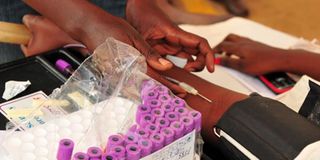How National Health Insurance Scheme will benefit Ugandans

A medical officer takes blood samples from a patient. The National Health Insurance cover will relieve households from the ills of out-of-pocket expenditure by providing financial protection to citizens against catastrophic health expenditures. PHOTO BY RACHEL MABALA
What you need to know:
The National Health Insurance Scheme is expected to relieve ordinary Ugandans from directly pulling money out of their pockets to spend on medical bills, Lilian Namagembe writes.
Ugandans are optimistic that the long-awaited Health Insurance law that will give birth to the National Health Insurance Scheme (NHIS) for all citizenry is not far from enactment.
In July, the ministry of Finance awarded a certificate of financial implications to the National Health Insurance Bill, 2012 paving way for the creation of the scheme.
The NHIS is expected to relieve ordinary Ugandans from directly pulling money out of their pockets to spend on medical bills.
Drafted 13 years ago, the Health Insurance Bill, according to Health minister Dr Jane Ruth Aceng will initially see about 25 per cent of the 34 million Ugandans covered once it is enacted into law.
“The Bill awaits to be tabled in Cabinet for approval before sending it back to the ministry [of Health] from where it will be re-tabled in Parliament,” Dr Aceng says.
Contributions
Once it is approved, civil servants and formally employed Ugandans will be required to contribute 4 per cent of their gross salary to which employers will top up with 4 per cent to make 8 per cent monthly contributions towards the pool.
According to government, the Health Insurance scheme will help to relieve households from the ills of out of pocket expenditure by providing financial protection to clients against catastrophic health expenditure such as organ transplant.
Currently, one needs about $25,000(about Shs90m) to cater for the cheapest kidney transplant in India which is the commonest destination for most Ugandans who seek treatment abroad.
The cost is, however, far beyond the $85 (about 303,709) income that Ugandans earn monthly on average, according to the Uganda National Household Survey Report 2009/2010.
As such, the scheme is expected to get rid of the constant media advertisements fundraising for life-saving operations out of the country.
Dr Jackson Amone, the chairman of the Medical Board, charged with qualifying and recommending patients for treatment says a total of 14 patients were recommended in 2016. However, those who cannot afford the treatment do not bother reaching out to the Medical Board.
He, however, notes: “It is not mandatory for all public servants to qualify to be sponsored by the government to go abroad for treatment.”
But Dr Aceng explains that the scheme for the start will cater for only basic treatment until other packages including one for specialised treatment such as complex surgeries and organ transplant, will be brought on board.
She adds that with time, other citizens in the informal sector will be included on the pool to benefit.
Through cost sharing where patients will be required to contribute under the same scheme, the cost of organ transplant is also expected to go down to $8,000(about 28m) once Mulago Hospital starts carrying out transplants locally.
Nevertheless, the health insurance players under the Uganda Community Health Insurance have since criticised the Scheme, saying in its current form, it is only targeting 10 per cent of the population in the formal sector. These, the players, say will lock out more than 80 per cent of the population in the informal sector.
Eligibility
Under Section 4 of the proposed Bill, eligibility is for public servants and all employees in the formal sector who are residents in Uganda.
The 2013 National Health Accounts survey, an international technique for tracking financial flows in a country‘s health sector, indicated that government spends $11 per capita (Shs39,600) or roughly about $1(3,600) a month.
Similarly, government spends Shs7, 020 per person per capital at Mulago National Referral Hospital which is far below the required Shs100,000 per capita.
This health financing gap, Dr Baterana Byarugaba, the executive director of Mulago Hospital, says will easily be solved by the NHIS where patients will be contributing to the cost of treatment as opposed to free treatment.
The commission for Microeconomics for Health recommends that government should annually spend at least $34(122,400) on the health of every citizen –from its own resources.
Statistics from ministry of Health also indicate that Malaria, HIV/Aids, pneumonia, anaemia and tuberculosis are the leading causes of mortality in Uganda.
The VIP’s treatment abroad on recommendation of the Medical Board costs tax payers an average of Shs72m for every official, excluding that of air tickets, upkeep and expenditure on attendants.




